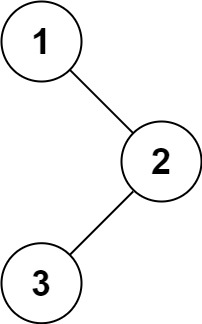LeetCode-in-All
94. Binary Tree Inorder Traversal
Easy
Given the root of a binary tree, return the inorder traversal of its nodes’ values.
Example 1:

Input: root = [1,null,2,3]
Output: [1,3,2]
Example 2:
Input: root = []
Output: []
Example 3:
Input: root = [1]
Output: [1]
Example 4:

Input: root = [1,2]
Output: [2,1]
Example 5:

Input: root = [1,null,2]
Output: [1,2]
Constraints:
- The number of nodes in the tree is in the range
[0, 100]. -100 <= Node.val <= 100
Follow up: Recursive solution is trivial, could you do it iteratively?
To solve the “Binary Tree Inorder Traversal” problem in Swift with the Solution class, follow these steps:
- Define a method
inorderTraversalin theSolutionclass that takes the root of a binary tree as input and returns the inorder traversal of its nodes’ values. - Implement an iterative algorithm to perform inorder traversal:
- Initialize an empty list to store the inorder traversal result.
- Initialize a stack to track the nodes during traversal.
- Start with the root node and push it onto the stack.
- While the stack is not empty:
- Traverse down the left subtree by pushing all left child nodes onto the stack.
- Pop the top node from the stack and add its value to the traversal result list.
- Move to the right subtree of the popped node and repeat the process.
- Return the traversal result list.
- Return the inorder traversal result list.
Here’s the implementation of the inorderTraversal method in Swift:
/**
* Definition for a binary tree node.
* public class TreeNode {
* public var val: Int
* public var left: TreeNode?
* public var right: TreeNode?
* public init() { self.val = 0; self.left = nil; self.right = nil; }
* public init(_ val: Int) { self.val = val; self.left = nil; self.right = nil; }
* public init(_ val: Int, _ left: TreeNode?, _ right: TreeNode?) {
* self.val = val
* self.left = left
* self.right = right
* }
* }
*/
class Solution {
func inorderTraversal(_ root: TreeNode?) -> [Int] {
return inorderTraversalRecursive(root)
}
func inorderTraversalRecursive(_ root: TreeNode?) -> [Int] {
var result: [Int] = []
func inorder(_ root: TreeNode?) {
guard let root else {
return
}
inorder(root.left)
result.append(root.val)
inorder(root.right)
}
inorder(root)
return result
}
func inorderTraversalIterative(_ root: TreeNode?) -> [Int] {
guard let root else {
return []
}
var result: [Int] = []
var stack: [TreeNode] = []
stack.append(root)
while !stack.isEmpty {
let last = stack.last
if let left = last?.left {
stack.append(left)
} else if let right = last?.right {
let visited = stack.removeLast()
result.append(visited.val)
stack.append(right)
} else {
let visited = stack.removeLast()
result.append(visited.val)
stack.last?.left = nil
}
}
return result
}
}
This implementation performs an iterative inorder traversal of the binary tree using a stack, with a time complexity of O(N), where N is the number of nodes in the tree.

